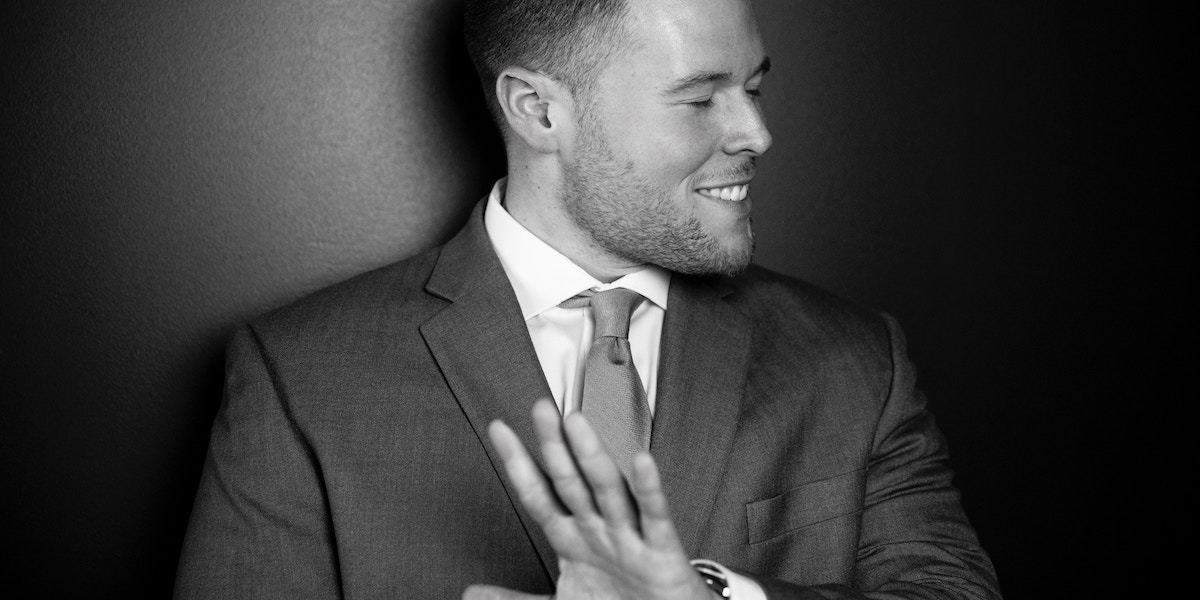READ ON TO DISCOVER:
- Why creatives should strive to produce more terrible work
- How to turn your family tree into a networking tool
- What happens when you take the Bible literally for an entire year
A.J. Jacobs is a renowned journalist and the New York Times bestselling author of six books, including The Year of Living Biblically, My Life as an Experiment, and Thanks a Thousand: A Gratitude Journey. He recently sat down with Jordan Harbinger on the Jordan Harbinger Show to discuss creativity hacks, the mixed wisdom of the Bible, and what it’s like to be a movie star—at least for an evening.
This conversation has been edited and condensed. To listen to the full version, click here.
Jordan: A few years back, you were doing an experiment for a book where you were living biblically for, was it a year? That’s a long time to not shave.
A.J.: I know, my wife wouldn’t kiss me for seven months—she just didn’t like the beard. I also tried to get extra wives, because in the Old Testament you can have 12 to 15, but she put the kibosh on that.
Jordan: What are some rules that modern humans follow out of habit, but that you no longer feel connected to after having lived biblically?
A.J.: It really made me realize that in biblical times, they didn’t have this idea of an individual—it was all about the community, and respect for your elders. You have to stand when an old person comes into the room, so I would do that. I once went to a restaurant in Sarasota, Florida, and I was up and down the whole night!
They were all about responsibility to the community, and we are all about individual rights. I’m all for individual rights, but I think that there’s a balance, and that we’ve gone too far to the individual side. What is your responsibility to the community?
Then there’s the Sabbath, which is almost like a digital detox from two thousand years ago. It’s this idea that, starting Sunday or Friday at sundown—depending on your religion—you just get off all your devices. They don’t say exactly that in the Bible, but they do say to stop working. Look around—devote that time to what’s around you. Devote it to your friends, to your family, to having meals, having wine. You have time to just stop the madness and reflect, just like a digital detox.
Trending: Navy SEAL Secrets for High Performance Under Pressure
There are so many insane rules, because it’s an old tribal book written by people who had some issues. But on the other hand, it does have some wonderful wisdom, and the Sabbath is one. Not gossiping as much is another—I still gossip, but I gossip 40% less, so that’s good. It’s actually quite freeing, because gossiping is like having junk food. It’s good going down, but then you feel dirty afterwards. So there’s something I would recommend people try for a week—just try not to trash talk anyone, and see how it goes. I think you’ll notice a remarkable mental shift.
Jordan: When you were going through the old rules, you must have gone, “Why can’t I wear mixed fabrics? This is just dumb.”
A.J.: Yeah, you cannot wear clothes made of mixed fibers—God was micromanaging. But the argument from religious people is that following those is actually even more important, because it shows your commitment and your willpower—like you can do something that makes no sense whatsoever.
“Barack Obama is my fifth great-aunt’s husband’s brother’s wife’s seventh great-nephew. So, we’re very close.”
Jordan: Where did that one come from?
A.J.: There are a bunch of theories, but no one knows for sure. One is that wool comes from the shepherds and linen comes from the farmers, and the shepherds and farmers had a feud. Who knows?
Jordan: You also went down the rabbit hole of proving that all humans are related. Can we talk about that for a second? Because I think people go, “Yeah, yeah, we’re all from Africa,” but then we really don’t treat each other like that at all.
A.J.: That journey started because I got this email out of the blue from a guy who said, “You don’t know me, but I’m your eighth cousin.” And I, of course, thought, “Okay, he’s going to ask me to wire $10,000 to Nigeria.”
But it turns out he was legitimate, and he is one of this group of people—thousands of people, scientists and researchers—who are trying to build the biggest family tree in history. And it’s not a tree but a forest, because we’re talking about millions of people. Right now, about 150 million people are all connected on the same tree, from over 100 countries and of every ethnicity you can think of.
Part of me was like, “Do I really want 150 million cousins? I have some members of my family now that I’d be happy to cut out.” But another part of me was like, “This is astounding!” Because since we were kids, we’ve been taught this cliché that we’re all one big family. But now you can see it concretely through DNA, through these massive online family trees, where thousands of people are working together. And you can actually see the connections—it’s like Six Degrees of Kevin Bacon. For instance, Barack Obama is my fifth great-aunt’s husband’s brother’s wife’s seventh great-nephew. So, we’re very close.
Jordan: Have you ever tried to communicate that to him?
A.J.: I did send a note inviting him to Thanksgiving and I haven’t heard back, but I will say this—sometimes it works. I wanted to interview George H.W. Bush for the book because he was the patriarch of this historic family. So I called his chief of staff and said, “I’d like to interview President Bush.” She says, “He’s not doing any interviews.” And I said, “Totally understand. Just so he knows and you know, we are cousins.” And I told her we were, like, 12th cousins three times removed. And remarkably, she said, “Well, in that case, let me see what I can do.” So as a practical tool for entrepreneurs or whoever is out there, you might want to go on these websites that have these family trees, because it’s like LinkedIn. You can approach people and say you’re cousins. Half of them are going to say, “Never contact me again”—but I did get to interview George H.W. Bush.
Part of that book was all about connection—and that we are, in fact, connected—and the hope was that we would treat each other with a little more kindness. And I do believe it happens—I call it the “Judge Judy Effect.” Because I always found Judge Judy to be abrasive, and obnoxious, and one of the least pleasant people on earth. But then I found out she’s my sixth cousin, and I was like, “You know what? She’s not so bad. She’s just Judge Judy!”
“Since we were kids, we’ve been taught this cliché that we’re all one big family. But now you can see it concretely through DNA.”
Jordan: I wonder what percentage of our day we spend in the frustrated or negative mode. Is there any science to this?
A.J.: I have not seen any research, but for me, I would say I was in this state of general annoyance over half the time—and that’s not a good way to go through life.
Trending: How to Make Menopause the Best Time of Your Life
One of the most important skills I try to teach my kids is metacognition, which is being aware of your thoughts, sort of standing outside and looking at your thought stream and saying, “That’s not a good way to use your time.” This is a weird strategy, but it works for me—I talk out loud to myself a lot. I find it helpful because it makes you more aware of your thoughts, and when you’re going into a dark place and ruminating on these negative thoughts, you notice that more easily when you’re saying it out loud. And then you can take a pause and be like, “Is my brain acting up? Do I need to rein it back in?”
I find it beneficial because you’re also more aware when you hear a good idea, and you’re more likely to remember it. One of the secrets of creativity is just quantity.
Jordan: Absolutely. In this one study, they had three groups of students making different pieces of pottery. They were all instructed to make the best pot they could, and one group was instructed to do it by taking a whole month to make just one perfect pot. One group was the control, and then the third group was instructed to make as many pots as they could, and then pick the best one. They repeated this in a controlled way, and the group that made a hundred pots had, by far, the best results. They just made so many pots and made so many mistakes, which they learned from. So it’s the quantity that gets you the quality that you want.
It makes sense, right? If you write something every day, most of it might be crap. But eventually, what you’re creating is going to be decent. It’s a numbers game.
A.J.: I once did an article on creativity hacks. I talked to all these professors, and one of them said just that. He said that even the greats like Picasso—a lot of his stuff sucks, but a lot of it is wonderful. The general point is you’ve got to go through hundreds of ideas to find the gems. To me, one of the challenges is figuring out, which are the gems? Which are the good ones? I have a couple of strategies that I use. One is, is it something that I think about in two weeks or a month, something that I think back to and say, “You know what, that’s a pretty good idea”? That’s a little hint.
Jordan: So you use your memory as a filter for good and bad ideas?
A.J.: I use my memory, and I also use people. I used to be extremely paranoid about telling people my ideas, thinking that they might steal them. I suppose occasionally that might happen, but I think the benefits of telling people what you’re working on far outweigh the cost, because you can see it in their face if they’re interested.
“Even the greats like Picasso—a lot of his stuff sucks, but a lot of it is wonderful. You’ve got to go through hundreds of ideas to find the gems.”
I’ve also noticed that a lot of creative ideas come about because you say it out loud to people, and they sort of riff on it. I have a friend, Adam Mansbach who made a Facebook post eight years ago. It was just a joke—he’s like, “My kids are such a pain. I’m going to write a book called, Go the Fuck to Sleep.” He was just joking, but then all of his friends were like, “That’s a great idea. You should actually do that!” He’s like, “Well… maybe I should.” And he did it. Sometimes it’s good to just throw something out there, and if people react, maybe you’re onto something.
Trending: Microsoft, Google, and Beyond: What Business at the Cutting-Edge of AI Looks Like
Jordan: There’s a version of the book where Samuel L. Jackson is doing the voiceover. He’s one of those guys where I really relate to a lot of what he says. I can’t remember who was interviewing him, but they said, “What’s it like being a celebrity?” If you ask that of somebody else, they’ll be like, “Oh, I’m just grateful and blessed that I’ve got work.” He’s like, “No, this is awesome.”
A.J.: One of my first experiments in journalism was being a movie star for a day, and it was pretty freaking awesome. Right at the start of my career, there was a movie out called Shine, which was about a pianist who had schizophrenia, and the actor who played the pianist as a young man looked exactly like me. His name was Noah Taylor. I was working at an entertainment magazine, and we found out he wasn’t going to the Oscars. They were like, “Well, what if you went to the Oscars and pretended to be him, just to see what it’s like to be a movie star?”
Jordan: I assume you did not get his permission to do this.
A.J.: I did not get his permission, but I never actually said, “I’m Noah Taylor.” Everyone just assumed it, because I look so much like him. I had this terrible haircut that he had, plus these thick glasses—it was a weird look. But we rented a limo, I stepped out on the red carpet, and it was just a sea of adulation. Like, “Noah, we love you! We love you!” I would sign autographs, but I never signed his name. I would sign “Shine on” since the name of the movie was Shine.
But yeah, the nonstop adulation went to my head. Rationally, I knew it wasn’t for me. But I remember coming back to New York a few days later, and I would be in line at the grocery store and be like, “Don’t they know who I am?” I was like, “Oh yeah, I’m nobody.”
But it was astounding. People at the Oscars would come up to me and confess, “I also had a horrible childhood.” They would just open up, because they felt like they knew me. Even Will Smith told me that he was a fan. The only awkward moment was with Geoffrey Rush. He was the star of the movie—he played the same character as an old man—and I got cocky. I went up to him during the Oscars, and I had this fake Australian accent, which sounded more like the Lucky Charms leprechaun. And I went, “Hello, Geoffrey. It’s me!” And he just looked at me like, “Who the fuck are you?” So, that was super awkward. The rest of it was [great].
I did feel a little guilty that I went—I knew this guy’s agent, and afterwards I wrote him, thanking him and apologizing. And he said that this actor was actually quite grateful that I went in his stead, because he didn’t like award shows!
Ready for more big ideas like this? Join the Next Big Idea Club today!





























